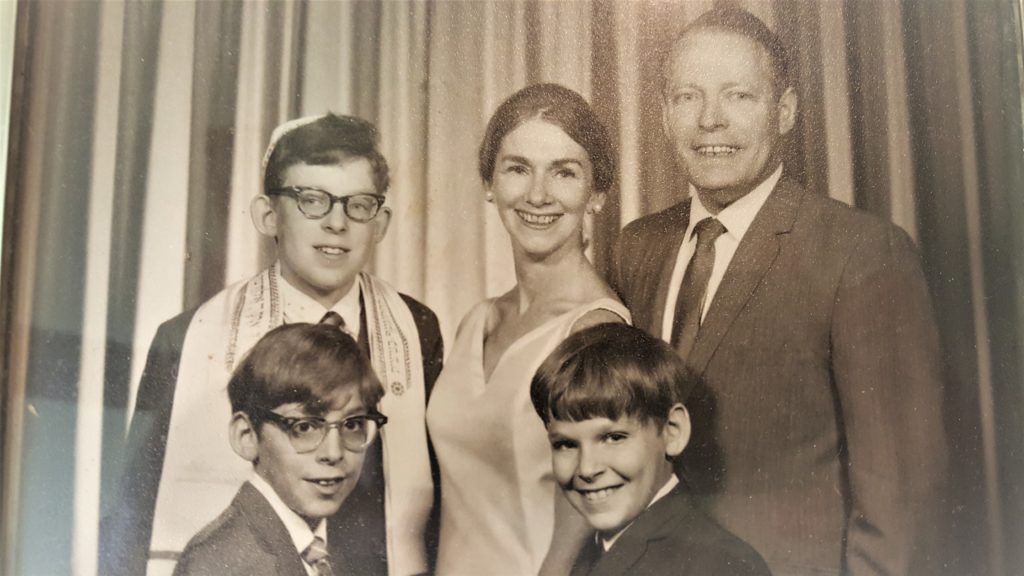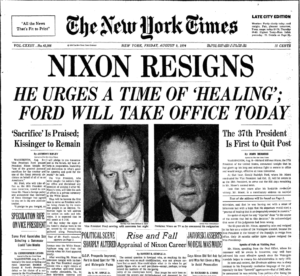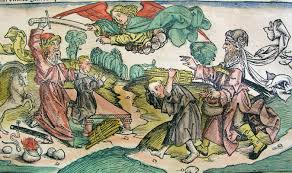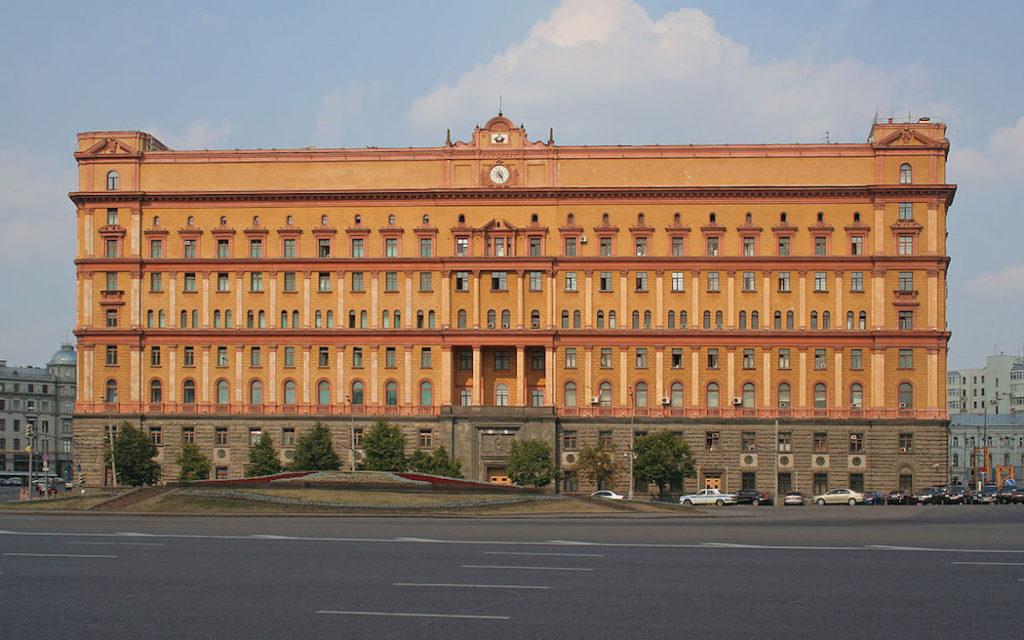Let me tell you a story. When I was 21, way back in 1975, I was studying at the University of Leeds in England, and I took a two week trip to the Soviet Union. You couldn’t travel on your own, and had to be part of an organized tour, and our tour had Kiev, Moscow, and Leningrad as the major stops. It was great; everywhere I went Jews asked me if I was Jewish (I guess I look it) and I tried to converse with them the best that I could. Our tour seemed to stop at every memorial to the Great Patriotic War, of which there seemed to be no end with one exception—it did not stop, despite our asking, at the monument at Babi Yar, outside of Kiev. Anyway, I loved the trip—a ballet at the Bolshoi, an opera at the Kirov; one of these years I have to get back to St. Petersburg, which I still think is the most beautiful city I have ever seen, and we were there in early July, when it stays light in the city until the wee hours.
Category Archives: Articles
Trump’s Mideast Magical Mystery Tour by Paul Scham*
 This is written as President Trump is returning to the United States – and I fully recognize that any minute after it’s published that something may emerge – from him or from anywhere – totally reversing our perceptions of what occurred. But life and attention spans are short, so we gotta go on what we see.
This is written as President Trump is returning to the United States – and I fully recognize that any minute after it’s published that something may emerge – from him or from anywhere – totally reversing our perceptions of what occurred. But life and attention spans are short, so we gotta go on what we see.
He enjoyed Saudi hospitality, is willing to forgive their Islam, and clearly appreciated the $110 billion in new military contracts he is bringing home. Moreover, he seems to believe the Saudis and most Arab states want very much to make peace with Israel (actually, there’s little doubt that’s true). And Bibi Netanyahu would very much like to make peace with them so long as they agree not to mention the P-word. But as alienated as Arab leaders are from their populations, they do recognize that the emergence of some recognizable sort of Palestinian state is an absolute prerequisite for normalizing their ties with Israel. Trump actually seems to get that, even if Bibi doesn’t. Of course, Bibi has to deal with a cynical population, much of which has long since written of the Palestinians as a negotiating partner. But Trump, as the quintessence of not-Obama, may conceivably be able to push Bibi in ways that Obama could only dream of. That is unlikely but we don’t know. No possible scrutiny of Trump’s words will reveal that; we will have to wait and see. I consider it conceivable – but barely; I would be shocked, astonished, and happy if that indeed plays out, but I won’t waste any time or energy expecting it.
My Bar Mitzvah and Israel’s War by Peter Eisenstadt
 I became a Bar Mitzvah on June 3rd, 1967. This was the last day Israel would ever spend under the boundaries of the 1949 armistice agreements. The Six Day War began the next day, the day you had to begin to distinguish “Israel” from “Pre-1967 Israel.” For half a century I have pondered the possible connection between those two events. Not that I think that my Bar Mitzvah in a small Reform synagogue in Queens had any impact on the course of events half a world away, but I have long thought that through this coincidence and synchronicity somehow the world was trying to send me a message, one that I have yet to figure out.
I became a Bar Mitzvah on June 3rd, 1967. This was the last day Israel would ever spend under the boundaries of the 1949 armistice agreements. The Six Day War began the next day, the day you had to begin to distinguish “Israel” from “Pre-1967 Israel.” For half a century I have pondered the possible connection between those two events. Not that I think that my Bar Mitzvah in a small Reform synagogue in Queens had any impact on the course of events half a world away, but I have long thought that through this coincidence and synchronicity somehow the world was trying to send me a message, one that I have yet to figure out.
Watergate Summers by Peter Eisenstadt
 I was eighteen in 1972. My life, like that of most 18 year olds was a life of transitions. I was at college, though still living at home, slowly leaving Hashomer Hatzair, which had dominated my life for the previous half dozen years, because I was ambivalent about making Aliyah. (I should have gone, but that is another story.) And then, it happened as the famous phrase goes, “in the early morning hours of June 17th, ” five burglars were discovered inside Democratic Party headquarters at the Watergate complex in Washington, DC. The next two years were the happiest political years of my life. I still think June 17th should be made a national holiday.
I was eighteen in 1972. My life, like that of most 18 year olds was a life of transitions. I was at college, though still living at home, slowly leaving Hashomer Hatzair, which had dominated my life for the previous half dozen years, because I was ambivalent about making Aliyah. (I should have gone, but that is another story.) And then, it happened as the famous phrase goes, “in the early morning hours of June 17th, ” five burglars were discovered inside Democratic Party headquarters at the Watergate complex in Washington, DC. The next two years were the happiest political years of my life. I still think June 17th should be made a national holiday.
On Psalms and Mother’s Day by Ayala Emmett
 On Sunday May 14, I opened the door and found, right next to my home delivered newspaper, a beautiful Mother’s Day bouquet of yellow roses and a card from my family.
On Sunday May 14, I opened the door and found, right next to my home delivered newspaper, a beautiful Mother’s Day bouquet of yellow roses and a card from my family.
Every Sunday I open my front door to pick up The New York Times. I read the paper leisurely over what I consider a feast cholesterol breakfast of several kinds of cheeses, an egg-white omelet, toast, fruit and strong coffee.
Today in my dinning room there is a sudden burst of sun through an otherwise cloudy morning and the light streams in with a glow. I am joyous at the sheer gift of bright sunshine that fills the room, the table, greeting cards from friends and kin, the food, and now the flowers of beauty, of care, and connection.
Impeachable Him by Peter Eisenstadt
 They were a bunch of old rich white men, half of whom were slave owners, immensely self-interested, and they created the Electoral College, and the ridiculous provision that every state should have two members in the Senate, so that Wyoming (population 700,000) and California (population 35,000,000) have equal representation. Our so-called Founding Fathers, and I don’t care how many catchy tunes there are in Hamilton, they got a hell of a lot of things wrong. Don’t get me started.
They were a bunch of old rich white men, half of whom were slave owners, immensely self-interested, and they created the Electoral College, and the ridiculous provision that every state should have two members in the Senate, so that Wyoming (population 700,000) and California (population 35,000,000) have equal representation. Our so-called Founding Fathers, and I don’t care how many catchy tunes there are in Hamilton, they got a hell of a lot of things wrong. Don’t get me started.
But there are some things they got right. In recent weeks I have been thinking a lot about the Declaration of Independence and the US Constitution. If there is one idea animating both documents, it is an opposition to tyranny. The Declaration of Independence is all about the tyrannies of King George III; taxation without representative, closing legislative bodies, interfering with commerce, sending armies to crush the rebellion—if you have forgotten the particulars, and you want to celebrate the 4th of July a bit early, read it again—all leading to the conclusion that “the history of the present King of Great Britain is a history of repeated injuries and usurpations, all having in direct object the establishment of an absolute Tyranny over these States.”
Why Do We Open the Door At The Passover Seder by Ayala Emmett
 The Passover Seder is the retelling of our passage from slavery to freedom, our defining central journey. We begin the Seder by opening the door to say, “All who are hungry, come and eat. All who are needy come and celebrate Passover with us.” This is the night that we are seated around the table, friends and families, to narrate our history as a people. We raise the matzah plate and recite, “This is the bread of poverty that our ancestors ate in the land of Egypt.”
The Passover Seder is the retelling of our passage from slavery to freedom, our defining central journey. We begin the Seder by opening the door to say, “All who are hungry, come and eat. All who are needy come and celebrate Passover with us.” This is the night that we are seated around the table, friends and families, to narrate our history as a people. We raise the matzah plate and recite, “This is the bread of poverty that our ancestors ate in the land of Egypt.”
The exodus powerful narrative has produced enduring timeless Jewish values of care, compassion and justice as foundational and compelling. In some communities it is customary to put an empty plate on the table to remember those less fortunate, those who are suffering, those in need of shelter, the homeless and the hungry. We who follow the custom, place pledges on the plate and commit to do a mitzvah of our choice to alleviate suffering in the coming year.
My God, Why Have You Abandoned Me (Psalm 22) by Matia Kam
 This intense psalm describes a state of frightening loneliness, of abandonment, of God’s face hiding, and of the psalmist’s sense of being a worm rather than human.
This intense psalm describes a state of frightening loneliness, of abandonment, of God’s face hiding, and of the psalmist’s sense of being a worm rather than human.
The metaphor of a worm is striking and unique, precisely because it is so rarely used: it appears only twice, in this psalm and in Isaiah’s prophecy (44).
The Psalm begins with a piercing cry, “Eli, Eli, My God, My God, why have You abandoned me”; a scream of existential loneliness of the psalmist, “You are my God, no one but You has ever been my God, why have You deserted me now?!.” The cry is about a double separation: the spatial distance from God – “until You will not be close to me to be my salvation in times of need,” and the emotional remoteness – “until You cannot even hear my roaring,” and despite my loud cry that can be heard afar, “You would know nothing of my troubles”—abandonment as well as hiding God’s face (Malbim). All these become a daily unbearable pain, “ in the morning I call and you do not respond, and at night I have no respite.”
Real News From Mosul by Peter Eisenstadt
 The big news story today is that the Syrian government has probably used nerve gas against Syrian rebels, killing a number of civilians. Because we place poison gas in a different category from conventional means of killing people from the air, and because the Asad government is despicable, it has received a good deal of attention, temporarily driving the latest Trump scandal from the lead story in the news.
The big news story today is that the Syrian government has probably used nerve gas against Syrian rebels, killing a number of civilians. Because we place poison gas in a different category from conventional means of killing people from the air, and because the Asad government is despicable, it has received a good deal of attention, temporarily driving the latest Trump scandal from the lead story in the news.
The biggest problem in trying to follow the news in recent months hasn’t been fake news—though there certainly has been enough of that, thank you very much—but too much real news, like water from a burst dam, flooding everything, saturating our ability to follow it. It has been difficult to follow any one story as it quickly rushes by, and we all seem to be unable to concentrate on any one story for very long.
Rash Promises by Peter Eisenstadt
 Over the weekend, through the magic of the Metropolitan Opera’s Live in HD Series, I saw a performance of Mozart’s opera Idomeneo. It is Mozart’s first great opera (as opposed to the 10 or 12 very good operas) he had previously written. Premiered in Munich in 1781—the original theater is still standing—it found Mozart at a crossroads in his career. He was a young man of about 25, his days as a dazzling young prodigy days far behind him, and was now just another scuffling musician, albeit one of needing to prove that he could build on his early success and earn the big pricey commissions befitting his talent. (He had his share of successes, but, as perhaps the original member of the “gig economy” he continued to scuffle.)
Over the weekend, through the magic of the Metropolitan Opera’s Live in HD Series, I saw a performance of Mozart’s opera Idomeneo. It is Mozart’s first great opera (as opposed to the 10 or 12 very good operas) he had previously written. Premiered in Munich in 1781—the original theater is still standing—it found Mozart at a crossroads in his career. He was a young man of about 25, his days as a dazzling young prodigy days far behind him, and was now just another scuffling musician, albeit one of needing to prove that he could build on his early success and earn the big pricey commissions befitting his talent. (He had his share of successes, but, as perhaps the original member of the “gig economy” he continued to scuffle.)
